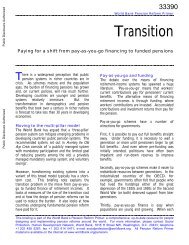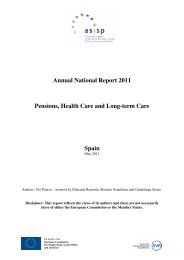Financial Sector Development in Africa: Opportunities ... - World Bank
Financial Sector Development in Africa: Opportunities ... - World Bank
Financial Sector Development in Africa: Opportunities ... - World Bank
Create successful ePaper yourself
Turn your PDF publications into a flip-book with our unique Google optimized e-Paper software.
The Reform Agenda for <strong>F<strong>in</strong>ancial</strong> Regulation and Supervision <strong>in</strong> <strong>Africa</strong> 155<br />
sectors went <strong>in</strong>to the crisis with a cushion of high levels of capitalization<br />
and liquidity.<br />
This reflects a broader trend of enhanced f<strong>in</strong>ancial stability <strong>in</strong> <strong>Africa</strong>n<br />
bank<strong>in</strong>g over the past decade. The 1980s and 1990s still saw a series of<br />
costly systemic and nonsystemic bank<strong>in</strong>g crises <strong>in</strong> <strong>Africa</strong>. As discussed by<br />
Honohan and Beck (2007), these bank<strong>in</strong>g crises of the late 20th century<br />
had a different face than non-<strong>Africa</strong>n bank<strong>in</strong>g crises. They were caused<br />
mostly by governance problems, either on a bank or a regulatory level, or<br />
simply by bad bank<strong>in</strong>g practices. This did not hold only for countries<br />
whose bank<strong>in</strong>g systems were dom<strong>in</strong>ated by government-owned banks,<br />
but also for countries with predom<strong>in</strong>antly private bank<strong>in</strong>g systems—both<br />
local and foreign banks.<br />
Important steps have been taken <strong>in</strong> most countries to improve the<br />
governance of banks (and regulatory entities), but these issues cont<strong>in</strong>ue<br />
to be a challenge <strong>in</strong> some countries. Privatization has helped <strong>in</strong> some<br />
<strong>in</strong>stances by reduc<strong>in</strong>g the conflict of <strong>in</strong>terest that public authorities face<br />
as both owner and supervisor of the same <strong>in</strong>stitution; <strong>in</strong> others, however,<br />
the process was not smooth and at first exacerbated governance challenges<br />
and fragility. Improved asset quality and <strong>in</strong>creased capitalization<br />
are the two dimensions where <strong>Africa</strong>n bank<strong>in</strong>g systems have made the<br />
most progress over the past two decades. Both have helped <strong>Africa</strong><br />
weather the f<strong>in</strong>ancial crisis. As a result, Laeven and Valencia (2008)<br />
report no s<strong>in</strong>gle systemic crisis on the <strong>Africa</strong>n cont<strong>in</strong>ent between 2000<br />
and 2007 (see figure 5.1).<br />
However, underneath this rather benign picture lie a number of more<br />
worrisome developments. The limited impact of the <strong>in</strong>ternational f<strong>in</strong>ancial<br />
crisis should not bl<strong>in</strong>d one to the potential future risks <strong>in</strong> <strong>Africa</strong>n<br />
f<strong>in</strong>ancial markets, which are largely homemade and not related to global<br />
market developments. <strong>Africa</strong> experienced an unprecedented period of<br />
credit growth when the <strong>in</strong>ternational crisis hit. Throughout 2008 and<br />
2009, the volume of credit to the private sector grew by over 30 percent<br />
year-on-year <strong>in</strong> more than two-thirds of <strong>Africa</strong>n countries. Once the crisis<br />
hit, average credit growth cooled down, but rema<strong>in</strong>ed positive, and many<br />
banks cont<strong>in</strong>ue to expand rapidly. Given the fast pace of growth, a<br />
buildup of risks is not unlikely. Most prom<strong>in</strong>ently, a couple of <strong>Africa</strong>n<br />
bank<strong>in</strong>g systems—such as those of Nigeria and Ghana—have come under<br />
considerable pressure <strong>in</strong> the past years. These domestic crisis episodes<br />
occurred because of domestic structural and governance weaknesses,<br />
which varied from country to country and highlight the need to re<strong>in</strong>force<br />
the regulatory and supervisory reform agenda across the region.







